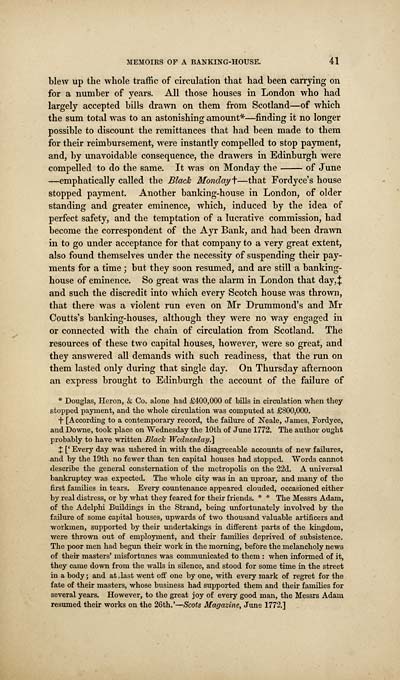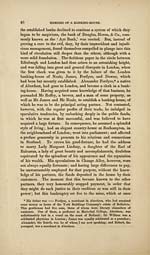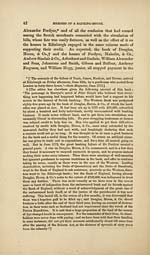Memoirs of a banking house
(59) Page 41
Download files
Complete book:
Individual page:
Thumbnail gallery: Grid view | List view

MEMOIRS OF A BANKING-HOUSE. 41
blew up the whole traffic of circulation that had been carrying on
for a number of years. All those houses in London who had
largely accepted bills drawn on them from Scotland — of which
the sum total was to an astonishing amount* — finding it no longer
possible to discount the remittances that had been made to them
for their reimbursement, were instantly compelled to stop payment,
and, by unavoidable consequence, the drawers in Edinburgh were
compelled to do the same. It was on Monday the of June
— emphatically called the Blach Monday ^ — that Fordyce's house
stopped payment. Another banking-house in London, of older
standing and greater eminence, which, induced by the idea of
perfect safety, and the temptation of a lucrative commission, had
become the correspondent of the Ayr Bank, and had been dra-wn
in to go under acceptance for that company to a very great extent,
also found themselves under the necessity of suspending their pay-
ments for a time ; but they soon resumed, and are still a banking-
house of eminence. So great was the alarm in liondon that day,|
and such the discredit into which every Scotch house was thrown,
that there was a violent run even on Mr Drummond's and Mr
Coutts's banking-houses, although they were no way engaged in
or connected with the chain of circulation from Scotland. The
resources of these two capital houses, however, were so great, and
they ansAvered all demands with such readiness, that the run on
them lasted only during that single day. On Thursday afternoon
an express brought to Edinburgh the account of the failui'e of
* Douglas, Heron, & Co. alone had £400,000 of bills in circulation when tliey
stopped payment, and the whole circulation was computed at £800,000.
+ [According to a contemporary record, the failure of Neale, James, Fordyce,
and Downe, took place on Wednesday the 10th of June 1772. The author ought
probably to have written Black Wednesdap.}
t [' Every day was ushered in with the disagreeable accounts of new failures,
and by the 19th no fewer than ten capital houses had stopped. Words cannot
describe the general consternation of the metropolis on the 22d. A universal
bankruptcy was expected. The whole city was in an uproar, and many of the
first families in tears. Every countenance appeared clouded, occasioned either
by real distress, or by what they feared for their friends. * * The Messrs Adam,
of the Adelphi Buildings in the Strand, being unfortunately involved by the
failure of some capital houses, upwards of two thousand valuable artificers and
workmen, supported by their undertakings in different parts of the kingdom,
were thrown out of employment, and their famUies deprived of subsistence.
The poor men had begun their work in the morning, before the melancholy news
of their masters' misfortunes was communicated to them : when informed of it,
they came down from the walls in silence, and stood for some time in the street
in a body; and at. last went ofi" one by one, with every mark of regret for the
fate of their masters, whose business had supported them and their families for
several years. However, to the great joy of every good man, the Messrs Adam
resumed their works on the 26th.' — Scots Magazine, June 1772.]
blew up the whole traffic of circulation that had been carrying on
for a number of years. All those houses in London who had
largely accepted bills drawn on them from Scotland — of which
the sum total was to an astonishing amount* — finding it no longer
possible to discount the remittances that had been made to them
for their reimbursement, were instantly compelled to stop payment,
and, by unavoidable consequence, the drawers in Edinburgh were
compelled to do the same. It was on Monday the of June
— emphatically called the Blach Monday ^ — that Fordyce's house
stopped payment. Another banking-house in London, of older
standing and greater eminence, which, induced by the idea of
perfect safety, and the temptation of a lucrative commission, had
become the correspondent of the Ayr Bank, and had been dra-wn
in to go under acceptance for that company to a very great extent,
also found themselves under the necessity of suspending their pay-
ments for a time ; but they soon resumed, and are still a banking-
house of eminence. So great was the alarm in liondon that day,|
and such the discredit into which every Scotch house was thrown,
that there was a violent run even on Mr Drummond's and Mr
Coutts's banking-houses, although they were no way engaged in
or connected with the chain of circulation from Scotland. The
resources of these two capital houses, however, were so great, and
they ansAvered all demands with such readiness, that the run on
them lasted only during that single day. On Thursday afternoon
an express brought to Edinburgh the account of the failui'e of
* Douglas, Heron, & Co. alone had £400,000 of bills in circulation when tliey
stopped payment, and the whole circulation was computed at £800,000.
+ [According to a contemporary record, the failure of Neale, James, Fordyce,
and Downe, took place on Wednesday the 10th of June 1772. The author ought
probably to have written Black Wednesdap.}
t [' Every day was ushered in with the disagreeable accounts of new failures,
and by the 19th no fewer than ten capital houses had stopped. Words cannot
describe the general consternation of the metropolis on the 22d. A universal
bankruptcy was expected. The whole city was in an uproar, and many of the
first families in tears. Every countenance appeared clouded, occasioned either
by real distress, or by what they feared for their friends. * * The Messrs Adam,
of the Adelphi Buildings in the Strand, being unfortunately involved by the
failure of some capital houses, upwards of two thousand valuable artificers and
workmen, supported by their undertakings in different parts of the kingdom,
were thrown out of employment, and their famUies deprived of subsistence.
The poor men had begun their work in the morning, before the melancholy news
of their masters' misfortunes was communicated to them : when informed of it,
they came down from the walls in silence, and stood for some time in the street
in a body; and at. last went ofi" one by one, with every mark of regret for the
fate of their masters, whose business had supported them and their families for
several years. However, to the great joy of every good man, the Messrs Adam
resumed their works on the 26th.' — Scots Magazine, June 1772.]
Set display mode to:
![]() Universal Viewer |
Universal Viewer | ![]() Mirador |
Large image | Transcription
Mirador |
Large image | Transcription
Images and transcriptions on this page, including medium image downloads, may be used under the Creative Commons Attribution 4.0 International Licence unless otherwise stated. ![]()
| Histories of Scottish families > Memoirs of a banking house > (59) Page 41 |
|---|
| Permanent URL | https://digital.nls.uk/94956810 |
|---|
| Description | A selection of almost 400 printed items relating to the history of Scottish families, mostly dating from the 19th and early 20th centuries. Includes memoirs, genealogies and clan histories, with a few produced by emigrant families. The earliest family history goes back to AD 916. |
|---|

